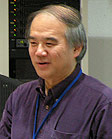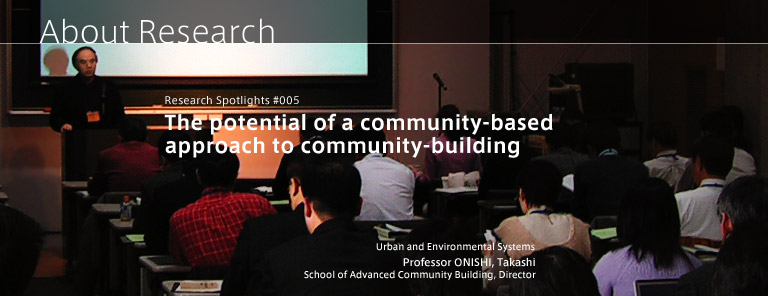In my department of urban and environmental systems, we have been running a school for advanced community building as a Super COE project. During the four years since the first event in March, 2002, a total of twelve events have been held, including two symposia. Most of these events were seminar-style workshops in community building.
Assessing interest in urban development

-
Initially,not knowing how many people would come all the way to RCAST to attend the school's events,we explored various options,such as holding events off-campus or holding them in grand fashion to attract as many people as possible. Once we started holding workshops, however,we found that there are many people all over the country who are concerned about urban development and were even willing to make the journey to RCAST,which is located outside of Tokyo's city center. There were so many people,in fact,that we actually had to turn some down. Recently, workshops have been held at RCAST and the number of applicants has reached nearly 100 people,making Q&A sessions and receptions lively events.
From "urban planning" to "community-building"

-
What exactly is"urban development"? In short,it refers to putting in place an urban environment which is comfortable to live in. Ms. Roberta Gratz, an American journalist who we asked to deliver the keynote address at the symposium held as the project's finale (March, 2006),describes a similar concept as "Urban Husbandry." Urban Husbandry"means the care, management or conservation of the built environment" (Roberta Brandes Gratz, The Living City, p. 147). The term"urban planning," which is a term also used in academia, is closely linked with terminology used in administrative affairs and is the focal point of institutional research. In contrast to this,"community building" has been used as term both in Japan and the United States that encompasses a broader conceptual definition, including a wide variety of community-based activities to maintain living spaces. Consequently, we have developed our community building school as both a"community-based approach to community-building" and the"management of community-building." While the former involves a coordinated effort between both community participation and consensus building, and government and citizens, the latter involves privatization, the use of private sector initiatives, and the adoption of a benefit assessment system, etc. Both treat community-based activities of city government and citizens as the central issue, which I feel is reflected in the school's lively Q&A sessions.
Towards full-fledged community-building

Now that Super COE has come to an end, how should we further develop this project? I suppose that there are two possible avenues for us to pursue. The first is full-scale operation of the school in order to develop human resources from government initiatives for community building that emphasize cooperation between citizens and the private sector. The other is contributing to future community building with research activities that delve into promising fields of research uncovered through our experiences with the school. I feel that, while the latter touches upon the mission of our research at RCAST, the former will yield results in the future through the efforts and cooperation of both the University of Tokyo and the community at large.
Professor Takashi Onishi
(February 1, 2006)


